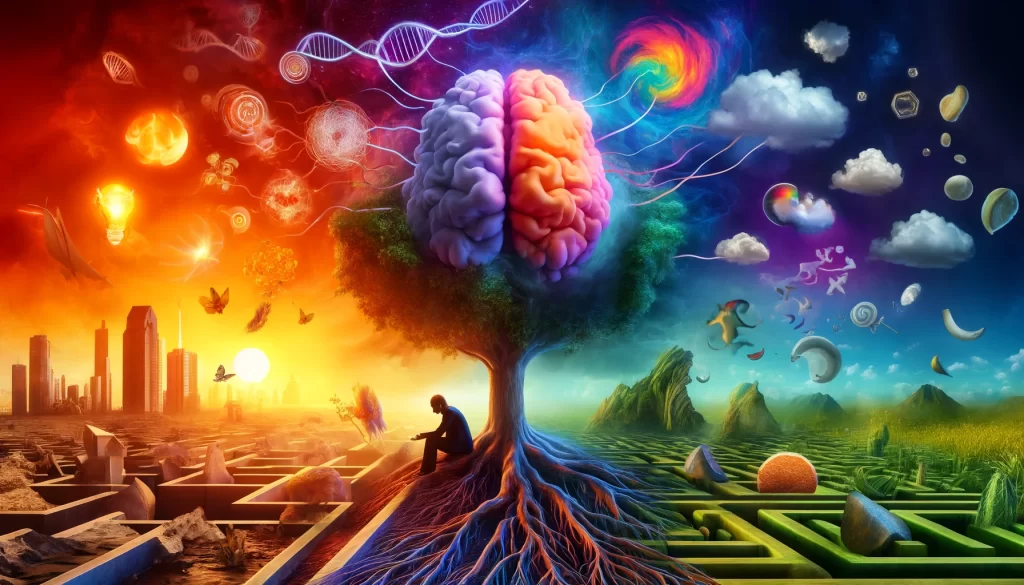Physical Address
304 North Cardinal St.
Dorchester Center, MA 02124

In today’s world, where the pace of life seems to accelerate with each passing day, mental health has become a topic of paramount importance. Among the myriad issues discussed, the intricate relationship between anxiety and depression stands out. Both conditions, prevalent across the globe, significantly impact individuals’ lives, warranting a deeper understanding and conversation.
Understanding the link between anxiety and depression is crucial for those affected and their loved ones. By exploring this connection, we can uncover insights into their coexistence, triggers, and the holistic approaches to treatment that promise a path toward better mental health and well-being.

Anxiety and depression, despite being distinct mental health disorders, are two of the most common conditions that intricately weave through the fabric of today’s society. Anxiety, characterized by persistent worry and fear, often manifests in physical symptoms such as restlessness, a racing heart, and difficulty concentrating. It’s a condition that primes the body’s fight-or-flight response, even in the absence of actual danger, affecting one’s ability to navigate daily life.
Depression, on the other hand, casts a shadow of persistent sadness, loss of interest in once-pleasurable activities, and a profound sense of despair. Individuals battling depression might experience changes in appetite, sleep disturbances, and a lack of energy, making even the simplest tasks feel insurmountable. It’s a condition that dims the light of hope, making it hard to see a way forward.
The distinction between anxiety and depression lies not only in their symptoms but also in the way they affect an individual’s perception of the world. Anxiety often relates to worry about future events, whereas depression is tied to a pervasive sadness about the current state of one’s life or reflection on past events.
Understanding these conditions requires recognizing their unique characteristics while also acknowledging the areas where they overlap. Such knowledge is vital for both those experiencing these feelings and healthcare professionals, paving the way for effective treatment strategies and a supportive environment that fosters healing and recovery.

The connection between anxiety and depression is complex, yet undeniable. These two conditions, while distinct in their symptoms and impact, often coexist in a symbiotic relationship. This link is primarily seen in how one condition can precipitate the other. For example, chronic anxiety can lead to depression, as the constant state of worry and fear can be exhausting, leading to feelings of hopelessness and despair.
Conversely, depression can breed anxiety. The pervasive sadness and lack of interest in life that characterize depression can make individuals more prone to anxiety. They might start to worry excessively about their future, their health, or their ability to manage daily activities, thus spiraling into a cycle of anxiety.
This interconnection suggests that the human mind’s response to prolonged stress, whether it be from anxiety or depression, can trigger the other condition. It highlights the need for understanding and treating these conditions not as isolated disorders but as interconnected elements of mental health that can significantly affect one’s quality of life.
Recognizing the signs of both conditions is crucial for effective treatment. It’s not uncommon for someone seeking help for one condition to discover they’re also dealing with the other. Understanding this link can lead to more comprehensive care strategies, encompassing both preventive measures and treatments that address the nuances of each condition.

The origins of anxiety and depression are multifaceted, rooted in a combination of genetic, environmental, psychological, and biological factors. Genetics play a significant role, with research indicating that individuals with a family history of either condition are at a higher risk. This genetic predisposition suggests that for some, anxiety and depression may be inherited traits, woven into the very fabric of their DNA.
Environmental factors, including life experiences and the world around us, also significantly influence the development of these conditions. Traumatic events, such as the loss of a loved one, financial problems, or high levels of stress at work or home, can trigger anxiety and depression. These experiences can leave lasting impressions on an individual’s mental health, altering their perception of safety and stability.
Psychologically, personality traits such as perfectionism or low self-esteem can predispose individuals to anxiety and depression. Those who are naturally inclined to view the world and themselves negatively are more susceptible to these conditions. This psychological aspect highlights the complex interplay between an individual’s character and their mental health.
Biologically, imbalances in brain chemicals known as neurotransmitters play a critical role. Serotonin, dopamine, and norepinephrine, which regulate mood and emotion, can contribute to the development of anxiety and depression when imbalanced. This biological perspective underscores the importance of medical intervention in treating these conditions, offering a pathway to rebalance these chemicals and alleviate symptoms.

The simultaneous treatment of anxiety and depression is not only possible but often necessary, given their interconnected nature. Addressing both conditions concurrently can lead to more effective outcomes , as the treatments for one often benefit the other. Cognitive-behavioral therapy (CBT), a type of psychotherapy, is particularly effective. CBT focuses on identifying and challenging negative thought patterns and behaviors, which are common in both anxiety and depression.
Medication, too, plays a crucial role in the treatment plan for many individuals. Antidepressants, such as selective serotonin reuptake inhibitors (SSRIs), can alleviate symptoms of both conditions by balancing the neurotransmitters in the brain. It’s important to note that medication may not be a one-size-fits-all solution, and finding the right type and dosage can take time.
Lifestyle modifications can also significantly impact the management of anxiety and depression. Regular physical exercise, for instance, has been shown to reduce symptoms of both conditions. It boosts mood, increases energy levels, and improves sleep. Similarly, a healthy diet, adequate sleep, and mindfulness practices like meditation can create a solid foundation for mental health.
Lastly, social support and therapy groups offer invaluable resources. Sharing experiences and strategies with others who understand can be incredibly reassuring. It helps individuals realize they are not alone in their struggles, fostering a sense of community and support. Together, these treatment approaches offer a holistic path toward managing anxiety and depression, emphasizing the importance of both professional guidance and self-care.

Adopting healthy lifestyle changes plays a crucial role in managing both anxiety and depression. These changes not only contribute to the overall well-being of an individual but also complement other treatment modalities, such as therapy and medication. Physical activity is a cornerstone of this approach. Engaging in regular exercise releases endorphins, known as the body’s natural mood elevators, which can alleviate symptoms of both anxiety and depression. Whether it’s a brisk walk, yoga, or more intense activities, the key is consistency and enjoyment in the chosen activity.
Nutrition also plays a significant role in mental health. A diet rich in fruits, vegetables, lean protein, and whole grains can impact brain chemistry and help regulate mood. Omega-3 fatty acids, found in fish and flaxseeds, have been particularly noted for their potential to lessen the symptoms of depression. Conversely, consuming high amounts of processed foods, caffeine, and alcohol can exacerbate anxiety and depressive symptoms, highlighting the importance of dietary choices.
Adequate sleep is another pivotal aspect. Sleep disturbances are common in those suffering from anxiety and depression. Establishing a regular sleep schedule and creating a restful environment can significantly improve sleep quality. This, in turn, can enhance mood and energy levels, contributing to a healthier mental state.
Mindfulness practices, such as meditation, deep breathing exercises, and mindfulness-based stress reduction techniques, can also be beneficial. These practices help individuals focus on the present moment, reducing the tendency to ruminate on past events or worry about the future. By incorporating mindfulness into daily routines, individuals can develop a more balanced perspective, reducing the intensity of anxiety and depression symptoms.

Recognizing when to seek professional help for anxiety and depression is a critical step in the journey towards recovery. These conditions can often become debilitating, affecting every aspect of one’s life, from personal relationships to professional responsibilities. When symptoms persist and significantly impair daily functioning, it’s a clear signal that professional intervention is needed. Early recognition and treatment can prevent symptoms from worsening and can lead to a more effective recovery.
A healthcare professional can offer a comprehensive evaluation, which is essential for devising an effective treatment plan. This evaluation often includes discussing symptoms, medical history, and possibly conducting some tests to rule out other conditions. It’s a collaborative process aimed at understanding the individual’s unique experiences and needs.
The variety of treatment options available means that with the right help, managing and even overcoming anxiety and depression is possible. Treatments can range from medication and therapy to lifestyle changes and support groups. Each person’s treatment plan will be tailored to their specific circumstances, with adjustments made as necessary to ensure the best possible outcomes.
It’s important to remember that seeking help is a sign of strength, not weakness. Acknowledging the need for assistance and taking steps to address one’s mental health is commendable. In doing so, individuals open the door to healing and the possibility of a brighter, more stable future.

Supporting someone with anxiety and depression requires patience, understanding, and a willingness to listen without judgment. It’s essential to acknowledge their feelings and validate their experiences, offering reassurance that their emotions are legitimate and that there’s hope for improvement. Open communication is key, allowing the individual to express their thoughts and feelings freely, which can be a significant step towards healing.
Encouraging the pursuit of professional help is another vital aspect of support. While offering a listening ear and a shoulder to lean on is important, professional guidance is often necessary to navigate the complexities of anxiety and depression. You can assist by helping them research therapists, making appointments, or even offering to accompany them if they’re comfortable with it.
Patience is crucial throughout their journey to recovery. Progress may be slow and non-linear, with good days and bad days. Celebrating small victories can help maintain a positive outlook, and it’s important to remind them that setbacks are a normal part of the healing process. Your unwavering support can provide a sense of stability and hope.
Lastly, educating yourself about anxiety and depression can make you a more effective supporter. Understanding the symptoms, treatments, and ways to manage these conditions can help you offer more empathetic and practical support. By learning about these mental health issues, you can help dismantle the stigma surrounding them, fostering a more open and supportive environment for everyone involved.

The intricate link between anxiety and depression underscores the complexity of mental health and the importance of addressing these conditions with a comprehensive approach. Recognizing the signs and understanding the connection between these disorders are crucial steps toward seeking help and beginning the journey to recovery. By embracing both professional treatment and supportive lifestyle changes, individuals can navigate their way through these challenges with resilience and hope.
Understanding and addressing mental health requires patience, education, and compassion, both for oneself and for others. For more information and resources on managing anxiety and depression, visiting reputable mental health websites can provide valuable insights and support. To learn more details, please visit our website.




